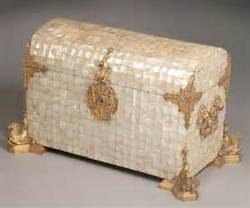 Some stories are just plain puzzling, disturbing, or head scratching, with an easy way in but no easy way out. As we head into 2015, I offer you one of those stories, from Tales of the Dervishes by Idries Shah, Pg. 31. Nuri Bey was a reflective and respected Albanian, who had married a wife much younger than himself. One evening when he had returned home earlier than usual, a faithful servant came to him and said: "Your wife, is acting suspiciously. She is in her apartment with a huge chest, large enough to hold a man, which belonged to your grandmother. It should contain only a few ancient embroideries. I believe that there may now be much more in it. She will not allow me, your oldest retainer, to look inside." Nuri went to his wife's room, and found her sitting disconsolately beside the massive wooden box. "Will you show me what is in the chest?" he asked. "Because of the suspicion of a servant, or because you do not trust me?" "Would it not be easier to just open it, without thinking about the undertones?" asked Nuri. "I do not think it is possible." "Is it locked?" "Yes." "Where is the key?" She held it up, "Dismiss the servant and I will give it to you." The servant was dismissed. The woman handed over the key and herself withdrew, obviously troubled in mind. Nuri Bey thought for a long time. Then he called four gardeners from his estate. Together they carried the chest by night unopened to a distant part of the grounds and buried it. The matter was never referred to again. (Idries Shah's notes follow the story: This tantalizing story is part of the repertoire of wandering (Kalandar) dervishes, whose patron saint is the 13th century Yusuf of Andulusia.)
0 Comments
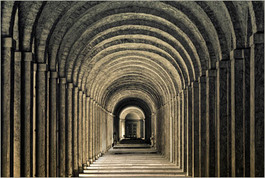 This Tuesday I am heading off to attend a silent meditation retreat led by my friend and colleague Rabbi James Jacobsen-Maisels. Years ago this song, Silence, was literally "delivered" to me in whole from somewhere beyond my conscious mind. The song itself is a meditation, and I invite you to close your eyes, breath slowly and deeply, and receive it as I did, in quiet contemplation. Blessings for a light-filled Hanukkah. Silence
Music/Lyrics Mark Novak and angelic shlichim Once upon a time there was the silence Hope was still a memory of future days ahead The waters parted company in silence And heaven kissed the earth so softly snuggled in her bed. The quiet desert moon reflects the silence Stories of the stars are heard in whispers over time Remember how we captured life in silence Drifting off to sleep to images and rhymes. Talking is more often done in silence The thoughts between the lines speak louder than our words Embarrassingly adolescent silence Truth is left unspoken, trembling like a bird. I recall in refuge I took silent So I could hear the beating of my heart reveal my name Where myth is woven peacefully in silence Eyes meet eyes meet ancient eyes - come dance before the flame G!d is resting comfortably in silence. Patiently he waits for us - take comfort, let him in Beauty is revealed to us in silence Returns us to the place where we can all renew again In Silence Silence Silence. ººººººººººººººººººººººººººººº My late rebbe, R' Zalman Schachter-Shalomi, zt"l, (זכר צדיק לברכה) was a master storyteller. He taught, in the name of Abraham Joshua Heschel zt"l: "a mayse is a story in which the soul surprises the mind". "A Year of Stories" is dedicated to his memory. I invite you to forward the link to these stories so that they find their way into the hearts of other listeners and tellers. ∞∞∞∞∞∞∞∞∞∞∞∞∞∞∞∞∞ If you would like to be added to the growing list of "Year of Stories" followers, let me know at [email protected], with "Year of Stories" in the subject line. 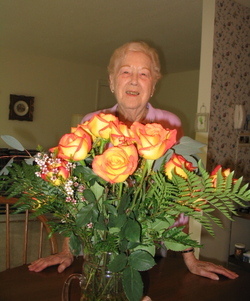 Shloshim is the number 30 in Hebrew, and this past Tuesday morning, immediately following Shacharit, the morning prayers, marked 30 days since my mother Elsie's burial. I have been going to synagogue daily to davven and to say Kaddish for her. When the moment arrives to stand and remember, the service leader asks everyone to share the name of the person whom s/he is saying Kaddish for. I say, "My mother, Elsie Novak, Osnat bat Moshe Bayer haCohen v'Nachuma." The mourners and those observing yahrtzeit proceed to say the words together, the text of the Jewish mantra which dating back to the 1st C BCE, words which serve to sanctify all life, as we gently guide the soul of our loved ones back to their source. While saying Kaddish last night I began to cry. The tears came not from immediacy of my mother's death, that has subsided with time, but rather from a fear that after only 30 days the recitation of the Kaddish was already feeling somewhat rote, routine, and G!d forbid, mundane. I don't want my remembering to become distracted habit, I want it to stay fresh and vibrant and heart-opening. How had 30 days had passed so quickly? The truth of that saddened me. The text of the Kaddish is engraved in me. I do not need to read it from the siddur. יהא שמה רבא מברך... With my hands free my mind began to wander. I heard the echo of a word that my mother used to use: PLICHING When it was raining very, very hard, my mother would say that "it's pliching out." I never had had any impulse to research the origin of the word, but during shiva, when many things have time to surface, I took the opportunity to pick up my English-Yiddish dictionary, and sure enough, there it was: פליוכרעגן (someone please help me with the pronunciation here). I smiled, and acknowledged that it had taken me all of my life to look up the word that my mother used so often. Why had it taken until now? More tears welled up. The Kaddish continued, לעלא מן כל ברכתא ושירתא Another word arose in my consciousness, KAMMONDAVING. My mom used this word to mean making a racket, or commotion, as in "Who needs all that kammondaving around the house." I was less successful finding any origin of this word in the dictionary. Perhaps my mother had made it up? The sense of the word did play a role before shiva started. I had decided that although I would let my various communities know of my loss, I was not going to advertise the times that we would be sitting shiva. I don't like the vibe after prayer, which more often than not turns into a loud social gathering as opposed to being in a house of mourning. I questioned my decision not to make the times public, but at one point realized, "That's my mother! She wouldn't have liked all the kammondaving in the house." Another way that my mother lives on through me. I have 10 months left to say Kaddish for my mom. The ritual will take me through the winter, spring, summer, and fall; through the entire year's cycle of holidays; through planting and tending and reaping and finally again laying to rest my beloved garden; through watching the budding of our lilac tree, until it flowers, when I will bend a branch to my nose, a havdalah moment, and I will gather in my mother's favorite fragrance. I will then say out loud, "Hello Mamale"; through another baseball season where every batter's intention is to circle the bases and return home. עשה שלום במרומיו הוא יעשה שלום... I wipe the tears from my eyes, and a sense of peace comes over me. Death, burial, shiva, shloshim; minyan, kaddish, breathe. אמן Amen  Minyan Oneg Shabbat has been offered a Matching Grant up to $1500. As of 12/11 only $418 more to raise by 12/31! Please consider offering a tax deductible donation of $18 or more to support this project and the work of DC's Jewish Renewal community Minyan Oneg Shabbat. All proceeds go to providing us with rental space and the ability to dream a little bigger. Ah, all those Greek gods to bow down to. Next month many of my colleagues and I will be gathering in a hotel outside of Boulder, Colorado for Ohalla, what my wife Renée calls a "rabbinic convention for unconventional rabbis". Years ago at the Tuesday night cabaret I, along with three others I will refer to as my "crew", perfomed a rap about Shabbat. Reb Zalman sat watching, totally perplexed, and at one point during the rap I jokingly feared for my future, saying, "I can see my teudah (ordination document) going up in flames as I speak." Lucky for me, Reb Zalman liked my davvening and storytelling! If you like the rap and you'd like a copy, it's available on iTunes for 99 cents. What a deal! Lyrics below. Enjoy! If You’re A Maccabbee (Hanukkah Rap) Music & Lyrics by Mark Novak
Let me tell you a story about days of old When the nights were long and the days were cold Alexander the Great was the king you see Of the land of Judea where the Jews were free To live and worship the only God Adonai Eloheynu Adonai Echad Now Alexander the Great despite his royal fame Grew old and died, ending his reign A new king arrived upon the scene A real pain in the tuchus, if you know what I mean He gathered together all of the Jews and said “Listen closely ‘cause I got bad news.” Now this King Antiochus, he thought he was wise He said, “You can’t observe Shabbat or be circumcised You have to pray to great Greek Gods Israel And sacrifice pigs - they squeal!” Bow down to idols of stone indeed That’s not being Jewish it’s plain to see But many Jews were afraid to disobey the king’s order They’d be put to death like a lamb to the slaughter There was a righteous man in Modin town named Mattathias, he refused to bow down he smashed the idols, cried passionately “Whoever’s for the Lord our God follow me!” Chorus If you’re a Macabee then your’re a hammer... I know you know what happens next in the story there are armies and fighting and it gets kind of gory Antiuchus’ army gets cut down to size By Judah and the Maccabbees, the good guys! Then there’s the cleansing of the temple and the search for oil For the ner tamid, would triumph be spoiled? Of oil they could only find one jar They looked here, there, near, and far. It’s a solid fact, a moment of mystery Nes, Gadol, Haya, Sham - that’s history. Chorus One last point for your edification Hanukkah’s the time for your rededication Be a modern Maccabbee - stand tall And hammer a world of peace and justice for all. Chorus 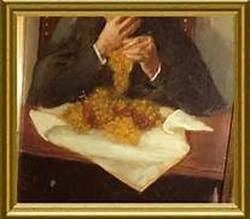 I always wonder about the origin of stories such as this one. The characters could just as easily be Jewish ones, so feel free to substitute characters to suit your tradition...or not. But first, a word from our sponsor.  We have been offered a Matching Grant up to $1500 As of 12/5 only $1364 more to raise by 12/31! Please consider offering a tax deductible donation of $18 or more to support this project and the work of DC's Jewish Renewal community Minyan Oneg Shabbat. All proceeds go to providing us with rental space and the ability to dream a little bigger. We will be forever grape-ful. Thank you. Now here is this week's story. ººººººººººººººººººººººººººººº
One day, a countryman knocked hard on a monastery door. When the monk tending the gates opened up, he was given a magnificent bunch of grapes. "Brother, these are the finest grapes my vineyard has produced. I’ve come to offer them as a gift." "Thank you! I will take them to the Abbot immediately, he will be delighted with this offering." "No", responded the countryman, "I brought them for you. For whenever I knock on the door, it is you opens it. When I needed help because my crop was destroyed by drought, you gave me a piece of bread and a cup of wine every day." The monk slightly bowed his head, and the countryman went on his way. The monk held the cluster of grapes and spent the entire morning admiring it. In reflection, he decided to gift the grapes to the Abbot, for it was the Abbot who always encouraged him with words of wisdom. The Abbot was very pleased with the grapes, and admired their beauty for some time, taking in the color and the shapes. He then recalled that there was a sick brother in the monastery, and thought, “I’ll give him the grapes. Who knows, they may bring him some joy and healing.” And that is what he did. The sick monk was overjoyed, and thanked the Abbot for his generosity. He too was taken by the beauty of the grapes, and saw in them a magnificent work of art, with patterns of repeated themes and slightly variegated colors. He reflected: “The cook has looked after me for so long, feeding me only the best meals. I’m sure he will enjoy these.” The cook was amazed at the beauty of the grapes. He carefully arranged them in a large platter alongside other fruit for the evening meal, and while admiring them, he realized, "These grapes are perfect, so perfect that no one would appreciate them more than the sexton." Many at the monastery considered him a holy man, a mystic, and he would best value this marvel of nature. But the sexton, in turn, gave the grapes as a gift to the youngest novice, that he might understand that the work of G!d is in the smallest details of creation. And when the novice received them, he quietly recalled the first time he came to the monastery, hoping to be among a community of people who knew how to value the wonders of life. He pictured the person who had opened the gates for him. And so, just before nightfall, he took the grapes to the monk at the gate. "Eat and enjoy them", he said. You spend most of your time alone here, these grapes are most deservedly yours. The monk humbly bowed his head and accepted the grapes, as he understood that the gift had always been truly meant for him. He relished each of the grapes, before falling into a pleasant sleep. (Story re-crafted by R' Mark Novak, found here: http://academictips.org/blogs/the-circle-of-joy/ ººººººººººººººººººººººººººººº My late rebbe, R' Zalman Schachter-Shalomi, zt"l, (זכר צדיק לברכה) was a master storyteller. He taught, in the name of Abraham Joshua Heschel zt"l: "a mayse is a story in which the soul surprises the mind". "A Year of Stories" is dedicated to his memory. I invite you to forward the link to these stories so that they find their way into the hearts of other listeners and tellers. ∞∞∞∞∞∞∞∞∞∞∞∞∞∞∞∞∞ If you would like to be added to the growing list of "Year of Stories" followers, let me know at [email protected], with "Year of Stories" in the subject line. 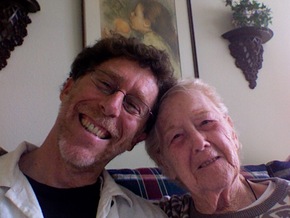 It is now 3 weeks post burial. My chest is a little less heavy, my gait a little freer from the weight of sadness. My beard is sorely in need of trimming, but when I look in the mirror, it doesn't matter, evidenced by the tears that still flow easily as I write this. Luckily, I am frequently in a setting where no one asks about my three weeks of facial hair, I am where everyone knows why my outward appearance is less socially presentable. I am in minyan. As we know, a minyan is necessary for the recitation of certain prayers, among them the mouner's kaddish, an opportunity to sanctify life, and my opportunity to help the return of my mother's soul to its source. Traditionally known as "kaddish yatom", I understand that term more acutely personal now. It is the "orphan's prayer", and I am now without both my mother and father. Reb Zalman would say that I now wear the "white beard". I am the elder. In an interview that she gave after her father died, singer Roseanne Cash shared that, no longer having a living parent, she now felt that "the last barrier between herself and her own mortality had been removed." That powerful insight remained with me, bookmarked for a future date, and was one of the first things that came to mind when my mother Elsie died. This past Sunday morning, as worship began, we only had 9 people. Those of us who were there to say Kaddish were keenly aware of the lack of a quorum to do so. On a weekday someone would have gone across the hall to ask one of the secretaries to join us. But on a Sunday, not so. When we reached the moment to say Kaddish d'Rabbanan, the leader called out a page number that signaled we were skipping Kaddish and moving on to the next section of the liturgy. Immediately, one of the women called out, "Wait, let me see if anyone is coming." The leader paused, and the woman left the room. Those of us remaining sat in silence, and waited - 1 - 2 - 3 - perhaps 5 minutes, before the woman returned with good news in the form of several additional people who were joining us. There was something about the quality of those minutes of silence that deeply resonated within me and between those of us who had sat quietly waiting. Time seemed to stand still. In the stillness I felt held by G!d and community. Reb Zalman teaches a possible understanding for ברוך שם כבוד מלכותו לעולם ועד to be "Your glory shines through time and space." Indeed, in the stillness the glory shined through - so true, so real, so effortless, so comforting. That evening, I returned to shul for Ma'ariv. One woman was saying kaddish for her father. It was her last day, after 11 months, that she needed to do so on a daily basis. She was clearly very emotional, and cried openly. She later shared that it was the anticipation she had about the "last day" that had shaken her. She thanked us all for our presence. I recalled the Kotzker Rebbe's gentle reminder that "there is nothing so whole as a broken heart". I also recognize that there is nothing so whole as a minyan. Ten adult Jews relying on each other's presence - to pray, to remember, to rebuild, to dream awake, and to hold each other in sacred community. |
Mark Novak is a "free-range" rabbi who lives in Washington DC and works, well, just about everywhere. In 2012 he founded Minyan Oneg Shabbat, home to MOSH (Minyan Oneg Shabbat), MindfulMOSH (Jewish mindfulness gathering), and Archives
June 2017
Categories
All
|
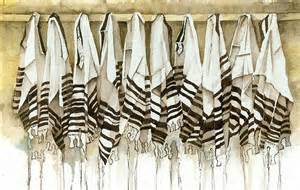
 RSS Feed
RSS Feed
